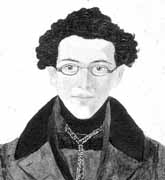Johann Georg Rosenhain
Quick Info
Königsberg, Prussia (now Kaliningrad, Russia)
Berlin, Germany
Biography
Johann Rosenhain was born into a Jewish family. His parents were Nathan Rosenhain and Röschen Joseph. He studied at Friedrich College in Konigsberg, then at the University of Königsberg where he was taught by Carl Jacobi and Julius Richelot. He was close to Jacobi and was inspired by him to undertake mathematical research into topics that interested Jacobi. While he was still a student he attended Jacobi's lectures and he edited them for publication. This was an outstanding start to his career and over the next few years he was exceptionally successful. He was awarded a doctorate by Königsberg for his thesis. In his thesis, which he wrote with Jacobi as his thesis advisor, he examined periodic functions in two variables.In 1844 Rosenhain submitted his Habilitation thesis to the University of Breslau and was appointed as a Privatdozent there in that year. In 1846 the Academy of Sciences in Paris announced that the topic for the next Grand Prix would be on the inverse problem for an abelian integral on a curve of genus two. He was awarded the prize in 1851 for his memoir Sur les Fonctions de Deux Variables et à Quatre Periodes, Qui Sont les Inverses des Intégrales Ultra-élliptiques de la Première Classe Ⓣ. Adolph Göpel independently solved the same problem but he did not submit his solution for the Paris Academy prize so basically they only received one solution to the problem. Perhaps not surprisingly, Rosenhain's methods are more closely linked to those of Jacobi than are the methods of Göpel. The memoir was published in 1851 in the Mémoires des Savants of the Academy of Sciences. In this Rosenhain introduced sixteen theta functions in two variables (as did Göpel, by the way). Burau writes [1]:-
Most important, Rosenhain demonstrated that the squares of the quotients of these sixteen theta functions can be conceived of as functions of the product surface of a hyperelliptic curve of genus 2 with itself. Starting from this point ... Rosenhain succeeded in demonstrating more simply than Göpel that these quotients solve the inverse problem for genus 2.As we said above, these years for Rosenhain had been stunningly successful. He had solved one of the major questions of the day, a question considered so important that it had been chosen as a Grand Prix topic by the Academy of Sciences. It was political events which now seemed to suddenly stop his progress, namely the revolution which swept across Europe in 1848. The revolution was triggered by events in France at the end of February 1848 and soon spread to Germany, where it became known as the March Revolution. In the south and the west of Germany, large popular assemblies and mass demonstrations took place. The main demands of the protestors were freedom of the press, freedom of assembly, arming of the people and a national German parliament. Supporters, however, wanted to achieve this change by non-violent means and sadly it seems that peaceful protest usually fails. Rosenhain joined the revolution on the side of the people but those who participated were soon in deep trouble when the king had gained full control. The failed revolution was followed by a period of political repression. Many of the former leaders of the movement were suspended from their duties and had to suffer under the repression organized by the monarch's secret police. Rosenhain's position at Breslau became untenable; he had no future there [1]:-
His participation in the revolutionary activities of 1848 deprived him any chance to further his career in Breslau. He therefore qualified as a lecturer again in 1851, this time at the University of Vienna.Rosenhain went to the University of Vienna in 1851. Then, in 1857, he returned to Königsberg as an extraordinary professor and he taught there until 1886. Returning to Königsberg was in itself a difficult move since he was moving back to Prussia where he had been marked as a supporter of democracy. Certainly the authorities could not risk Rosenhain returning to his democratic cause so they required him to sign an official declaration that he would not give any support to democratic movements. It is impossible to be certain why Rosenhain never published anything other than his Academy Prize paper despite having shown outstanding mathematical abilities. It is tempting to believe that the disruption to his career caused by the 1848 March Revolution was highly significant. Another possibility is that Jacobi's death in 1851, at a critical stage in Rosenhain's career, caused him to lose interest in research. However, we should note that he had never been that keen to publish; for example his Ph.D. thesis was never published nor did he write any papers using the results of the thesis.
It was not only as a mathematician that Rosenhain was extremely gifted for he was also gifted in languages and music. He taught until the winter semester 1884-85 in Königsberg, then was given leave and he went to Berlin. He died there.
References (show)
- W Burau, Biography in Dictionary of Scientific Biography (New York 1970-1990). See THIS LINK.
Additional Resources (show)
Other websites about Johann Rosenhain:
Written by J J O'Connor and E F Robertson
Last Update December 2008
Last Update December 2008
